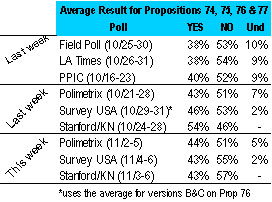Three of the organizations doing surveys in California released new polls today. Here are links to their releases:
- Survey USA – 2,056 likely voters interviewed by telephone with an automated methodology 11/4-11/6
- Polimetrix – 1,181 likely voters interviewed online, 11/2-11/5
- Stanford University/Hoover Institution/Knowledge Networks (press release and full results)– 389 likely voters interviewed online, 11/3-6
(See MP’s previous discussion of the unique methdologies employed by these pollsters)
With one exception, all three surveys now show all four of the propostions supported by Governor Schwarzenegger trailing, although some remain within sampling error. The exception is Proposition 75 (involving public employee union dues), which the Stanford survey shows running ahead by a statistically insignificant five points (52% to 47%).
Both the SurveyUSA and Stanford/KN surveys show declining support for all of the propositions falling since their previous surveys, although many of the declines on the SurveyUSA polls do not appear large enough to be statistically significant.
The declines in support on the Stanford/KN survey are more dramatic because, as they put it,
44% of the likely voters are now Democratic, compared to only 34% in the late October poll, indicating increased interest in the special election among Democratic voters.
At 44% Democratic, the latest Stanford/KN survey is now in line with the party affiliation results reported by the other surveys last week.
More later…
LATE UPDATE: RealClearPolitics has now added all of the new survey results to their summary page.
If we put aside the now mostly small differences between the polls a fairly clear picture emerges (keeping in mind the caveat that polls are generally less accurate when it comes to ballot propositions). All of the Schwarzenegger supported propositions are trailing, but Propositions 76 (state spending limits) and 77 (redistriction) appear headed for defeat by wide margins, while the votes on Propositions 74 (school teacher tenure) and 75 (union dues) look much closer.
The most interesting issue for MP, however, is about the differences among the various polling methodologies in use in California. Despite the fact that the polls from the “innovators” (SurveyUSA, Standford/KN and Polimetrix) have grown more consistent with each other since the last round of surveys,** some consistent differences remain when compared to the traditional telephone surveys (Field, LA Times and PPIC). The table below shows the average vote on the four Schwarzenegger propositions as measured by each survey organization. The new methology pollsters show average support about five points higher than the traditional telephone pollsters, although that greater support comes mostly from a lower undecided vote. The average opposition percentage is now about the same on all the polls

MP wouldn’t be surprised if the actual results fall somewhere in the middle, but in a little over 24 hours we should know for certain.
**Note: The Survey USA three-way question wording experiment on Proposition 76 also shows more consistency in their latest wave of interviews. None of this is surprising. MP has seen this pattern before. Consider that as we get closer to Election Day, more and more voters become familiar with the propositions, make up their minds and in some cases actually cast ballots. Similarly, “likely voters” get more and more certain about who they are. As such, the potential for minor differences in question wording or likely voter models to introduce differences between surveys diminishes and survey results get more consistent.